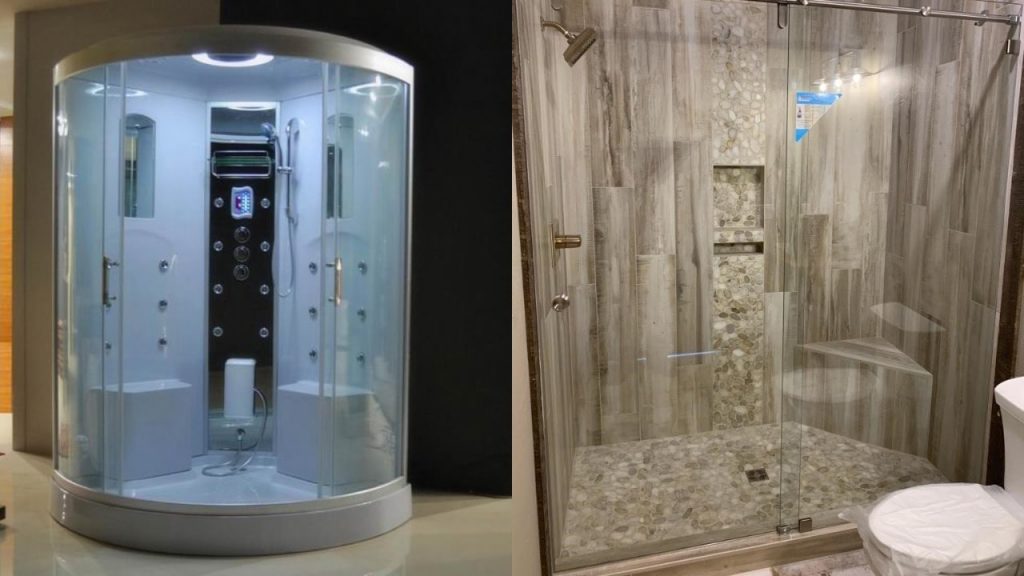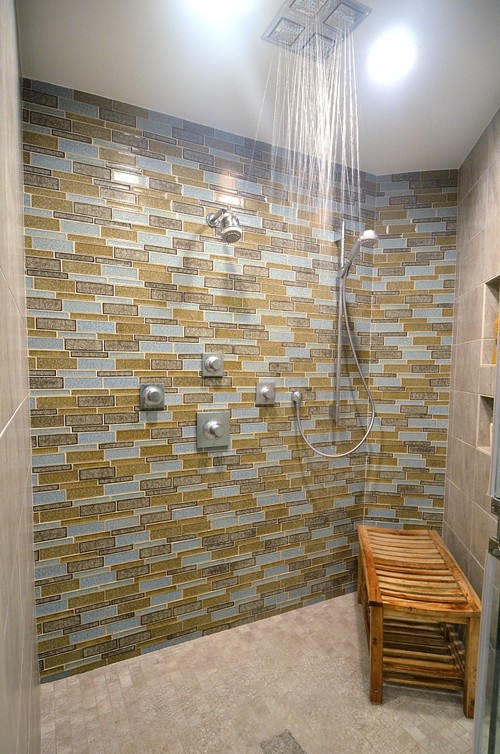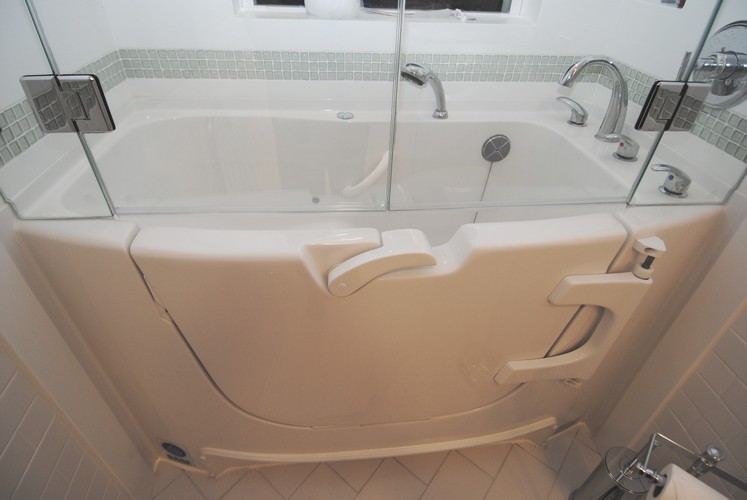When you first think of remodeling your shower, you probably think of choosing a new shower design that is more aesthetically pleasing, expanding the size of your current shower and possibly adding safety features that will help you better age in place, like safety bars, seating and non-slip flooring.
Of course, there’s a lot more to think about than size and safety features, including the shower floor material, water temperature control, and fixtures such as shower heads and faucets.
We walk you through many of the items we can install or upgrade when you hire Legal Eagle Contractors to remodel your shower.
Types of Showers
There are typically two types of showers available. You can choose a prefabricated shower, which is constructed out of durable, waterproof plastic, or you can choose a custom shower, which is constructed from your preferred materials in your preferred shape and style.
Custom Showers
Custom showers offer the greatest flexibility in design and style. They are more pricey than prefabricated showers, but you are guaranteed to get everything you want in your new shower. Custom showers can be constructed with as many shelves and cubbies as you desire. They can contain bench seats and even ergonomically friendly curved loungers so that you can relax after a long day. Custom showers can be finished with tile or stone, and they can include more than one shower head. You can even have steam nozzles installed in a custom shower for a sauna-like feel.

A prefabricated shower (left) and custom shower (right).
Prefabricated Showers
Prefabricated showers are less expensive than custom showers because they are already constructed and ready to be installed in your bathroom. These can be purchased as single-piece showers or as a kit that contains numerous pieces that must be fitted and sealed together. Widths range between 30 inches and 60 inches, and they can also be purchased in corner and neo-angle shapes. Typically, homeowners choose smaller showers for guest bathrooms and larger showers for the master bathroom.
Shower Parts
When it comes to creating your perfect shower, it’s important to understand the components involved in creating your shower.
- Accessories – Safety bars, seats, non-slip flooring, benches, loungers and shelves.
- Curtains – shower liners, decorative cloth curtains and shower rods. Typically used with bath and shower combos.
- Doors – Hinged, pivoting, sliding, usually made from glass or a clear or semi-clear composite material.
- Faucet – Typically used in shower/bath combos. Can be purchased in a range of finishes, including nickel, brass and oil-rubbed bronze.
- Floor/tray – Can be used in semi-custom showers and prefabricated showers. Tile, molded stone, acrylic and fiberglass are the 4 most common shower floor materials.
- Shower Guard – Typically used in bathtub/shower combos. It is a piece of fiberglass or acrylic that prevents water from spraying onto the floor from the shower.
- Seat/bench – Can be custom-built or pre-built into a fabricated shower for safety and comfort.
- Shower head – Hand-held, single-setting, multi-setting or shower tile with multiple settings and nozzles. You can even choose a shower that is concealed in the ceiling for an ultra-modern look. See our shower buying guide on shower heads, valves and faucets.
- Wall – Tile, stone, fiberglass or acrylic in a variety of styles and colors.
Shower Shapes and Styles
Showers can come in any shape or size. The most common showers are square or rectangular, but you can also opt for a corner style that offers a rounded or angled front edge.
- Square and Rectangular – Widths range from 30 to 60 inches, and you can purchase these with a shower door or for use with a curtain. Square and rectangular showers can be placed against walls or in corners, depending on the size. Great for master bathrooms.
- Rounded or Corner Showers – Designed to fit in corners. Usually contains two composite or tile sides and a rounded or angled door. Great for master or guest bathrooms.
- Tub and Shower Combos – Combination bathtub with a shower head included. These are most common for guest baths or homes that only have one bathroom.
- Walk-in or Curbless Shower – No step or tub to restrict entry. These showers are completely or partially open to allow easy access and are particularly useful for the elderly and people with reduced mobility. This style of shower is one of our most popular installations. See one of our walk-in installations below.

Common Shower Materials
- Composite – Fiberglass or acrylic, usually used for prefabricated showers.
- Stone – Marble, slate and granite, usually used in custom showers. Must be periodically sealed.
- Tile – Ceramic, porcelain or glass, usually used in custom showers for the walls and/or floor.
Types of Shower Water Controls
- Electric Shower Controls – No hot water connection needed. Hot water is heated on-demand inside the shower.
- Mixer Valve Shower Controls – Most common type of water control. Requires manually adjusting the knobs to control water temperature.
- Thermostatic Shower Controls – Water temperature is preset, which prevents scalding as well as the need to adjust the water temperature.
Universal Design/Accessibility Showers
In some instances, you may prefer a universally designed shower with specific accessibility features. For a bathtub/shower combo, adding accessibility may include installing a bathtub with a door for walk-in access as well as safety bars and seating. For universal accessibility in a shower, it may mean constructing a custom shower with no lip or rise at the entrance. This style allows individuals in wheelchairs and who use walkers and canes to walk directly into the shower without the risk of tripping over the edge of the shower.

Bathtub/shower combo with a door for easy access.
Costs Involved in Remodeling a Shower
While an entire bathroom remodel can cost as much as $30,000, a shower remodel is considerably less expensive. The average shower remodel costs between $5,500 and $10,000, but features such as expensive mosaic accent tiles, fold-down seats or benches will add more to the cost.
Home Remodeling Contractors VS DIY
Another common question among homeowners who are thinking about renovating and updating their showers is whether they should hire a contractor or perform their remodel as a DIY project.
DIY projects tend to cost less than a shower remodel that is entirely performed by a licensed, bonded and insured contractor. This is because you’re not paying labor charges, or you are able to choose specific contractors, like electricians and plumbers, yourself to better control costs.
Shower Remodel as a DIY Project
If you have plumbing, electrical and installation experience, you may be able to perform some or all of your shower renovation yourself, which would greatly reduce your costs. In fact, you could reduce your costs in materials, tools and time spent on the project. However, even with previous experience, you may still have to hire contractors to help you, especially if you plan to add electrical components to your shower, like lights and electric water controls, or plan to change where your shower head is located.
Hiring a Contractor to Perform Your Shower Remodel
Hiring a contractor to perform your shower remodel is more expensive but it may be the best option if you do not know how to start your project, what materials you need or only have a vague idea for your new shower. A professional bathroom remodeling contractor can take your ideas and turn them into reality. They can recommend the best materials for your needs, design your shower to your specifications and install that shower faster than you could install it yourself, which means you may be able to start using your shower in as little as a few days after you finalize the plans and the contractors start on the project. Not to mention, your shower will be safe and up to code, which is especially important if you plan to have lights and electronic water controls installed.
How Long Does it Take to Remodel a Shower?
The time to remodel your shower is dependent on the depth of the remodel. Custom showers typically take longer to install than prefabricated showers due to the design details, and the need for items like grout and adhesive to set and cure.
The first step is always the planning phase. This can take anywhere from a week to a month, depending on the initial designs and the changes that may need to be made due to material costs or additional thoughts. Ordering materials for your new shower can take anywhere from 1 to 8 weeks, depending on if your new shower includes any luxury or hard-to-find finishes.
Once construction starts, you can expect the demolition of your current shower to take about a day. If you need any custom plumbing or electrical work, you should expect that to take another day or two. The installation of the shower can take anywhere from one to seven days, and you may want to allot another day for cleanup and a walk-through of your new shower.
To learn more about shower remodels and how we can turn your existing shower into an area where you can wash and relax, give our bathroom remodel team a call at 713-723-8850. We serve the entirety of Houston and the surrounding areas.






